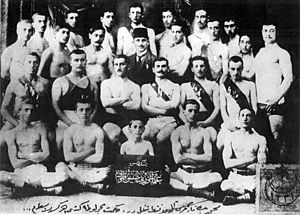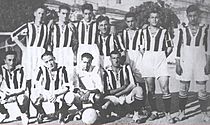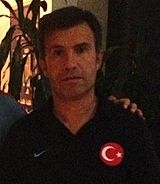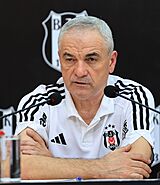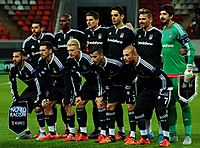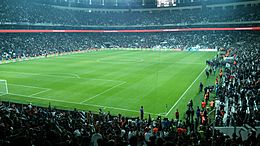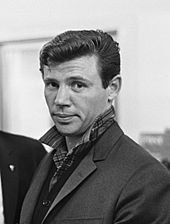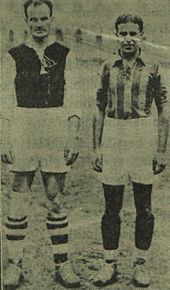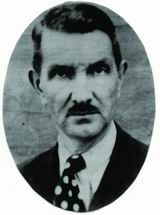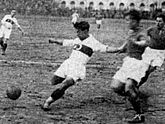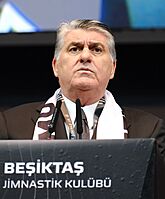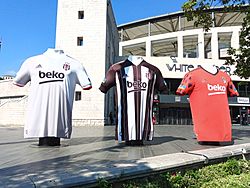Beşiktaş J.K. facts for kids
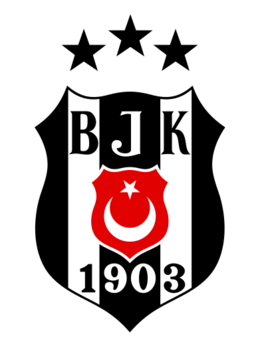 |
||||
| Full name | Beşiktaş Jimnastik Kulübü | |||
|---|---|---|---|---|
| Nickname(s) | Kara Kartallar (lit. Black Eagles) Siyah Beyazlılar (lit. Black and Whites) |
|||
| Short name | BJK | |||
| Founded | 3 March 1903 as Bereket Jimnastik Kulübü 1909 as Beşiktaş Jimnastik Kulübü |
|||
| Stadium | Beşiktaş Stadium | |||
| Capacity | 42,590 | |||
| President | Serdal Adalı | |||
| Manager | Ole Gunnar Solskjær | |||
| League | Süper Lig | |||
| 2021–22 | Süper Lig, 6th of 20 | |||
|
||||
Beşiktaş Jimnastik Kulübü (also known as BJK) is a famous Turkish sports club. It was started in 1903 in Istanbul. The club's football team is one of the "Big Three" in Turkey. They are one of the most successful teams and have never been moved down to a lower league. Beşiktaş was the first sports club officially registered in Turkey. It is also one of the few clubs allowed to have the Turkish flag on its badge.
The football team has won 21 league titles. This includes 16 Süper Lig titles. They have also won the Turkish Cup 11 times. Beşiktaş is the only team to win the Süper Lig without losing a single game. This happened in the 1991–92 season. The team last won the Süper Lig in the 2020–21 season. They won the Turkish Cup in the 2023-24 season. Their home stadium is Beşiktaş Stadium. It can hold 42,590 fans and is next to Dolmabahçe Palace. Many people think it is one of the best stadiums in the world.
Beşiktaş also plays in European competitions often. They reached the quarter-finals of the 1986–87 European Cup. In the 2017–18 Champions League, they had the best performance by a Turkish team in the group stage. They earned 14 points and did not lose any games. Beşiktaş has also reached the UEFA Europa League quarter-finals twice. This was in the 2002–03 and 2016–17 seasons. Beşiktaş is currently the 5th highest-ranked Turkish team in Europe. They are second all-time after their rival Galatasaray.
The club's fan group, Çarşı, is famous worldwide. They were chosen as the best fan group by American sports viewers. This was because of their 132-decibel noise record in a 2007 match against Liverpool. The group often supports social and political causes. They are known for being working-class and left-wing. They are sometimes called "the people's team." The highest number of fans ever at a Turkish league football game was recorded at a Beşiktaş-Galatasaray derby. There were 76,127 spectators at that match.
The club also has teams in other sports. These include women's football, basketball, volleyball, handball, and esports.
Contents
Club History
How Beşiktaş Started (1903–1911)
Bereket Gymnastics Club began on March 3, 1903. They got special permission from the government to start. After 1908, they had more freedom for sports activities. In 1909, Fuat Balkan and Mazhar Kazancı came to Istanbul. They found young people doing gymnastics in Serencebey. They convinced them to train together. Fuat Balkan was a fencing coach. Mazhar Kazancı was a wrestler and weight lifter.
Fuat Balkan made the first floor of his home the club's main office. It was in the Ihlamur area of Beşiktaş. The club's name was changed to "Beşiktaş Ottoman Gymnastics Club." It became a bigger club with gymnastics, wrestling, boxing, fencing, and athletics. Mehmet Şamil Şhaplı was one of the first members. He became the club's first president.
On January 13, 1910, Beşiktaş became the first officially registered Turkish sports club. This was in the Ottoman Empire. More young people in the area joined the club. The number of members quickly grew to 150. The club's office moved to a bigger building in Akaretler, Beşiktaş. The yard behind this building was turned into a sports field.
Some young people from the Beşiktaş area formed two football clubs. Their names were "Valideçeşme" and "Basiret." They joined Beşiktaş in 1911.
For many years, people thought Beşiktaş's first colors were "Red and White." They believed the colors changed to "Black and White" to remember those who died in the Balkan Wars. However, a study for the club's 100th anniversary showed something different. It found that red was never used in the club's first colors. The club's colors have always been "black and white."
Early Football Years (1911–1959)
Football became very popular in the Ottoman Empire around 1910. Beşiktaş members started to focus more on football. In August 1911, Ahmed Şerafettin started the football team. When World War I began, many athletes left to fight. Sports activities at the club almost stopped. After the war, the team faced a hard time during the occupation of Istanbul. But they recovered thanks to the hard work of Şeref Bey.
Beşiktaş did not join the Istanbul Friday and Sunday leagues at first. They did not win any championships until 1918. In 1918, they won the Istanbul Turkish 1st Sports League. They won it again in 1921. In 1924, Beşiktaş joined the Istanbul Football League. Other big Istanbul teams like Galatasaray and Fenerbahçe were also in this league. Beşiktaş won the first championship of the 1923–24 season. But Galatasaray and Fenerbahçe were the strongest teams until the mid-1930s.
Beşiktaş won their second Istanbul League title in the 1933–34 season. They also won their first Turkish Football Championship that same year. They beat Altay 3–1 in the final on October 29, 1934. In 1937, the Turkish National League was created. Beşiktaş finished 3rd in this league in 1941. The club won the Istanbul League again in 1944–45 and 1945–46. They also won the national league in 1944 and 1947.
In May 1950, the team visited the United States for a month. When they returned to Turkey, they visited President Celâl Bayar.
From Milli Lig to Süper Lig (1959–2001)
Professional football started in Turkey in 1952. In 1959, the Millî Lig was formed. This was the country's first professional football league. Beşiktaş won their first title in this league in the 1959–60 season. In 1960, the club also played in the European Cup. They were the first Turkish team to ever play in this tournament. Beşiktaş won back-to-back championships in 1966 and 1967. In 1967, they also won their first Turkish Super Cup.
After 1967, Beşiktaş's performance was not as strong for a while. They finished lower in the league many times. Other teams like Trabzonspor, Fenerbahçe, and Galatasaray had more success. Beşiktaş only finished second once in the 1970s.
After 15 seasons without a league title, Beşiktaş finally won again in the 1981–82 season. This was a surprise win under coach Đorđe Milić. They won another title in the 1985–86 season.
The Gordon Milne Era (1987–1993)
Beşiktaş had their most successful period in the Süper Lig under coach Gordon Milne. They won three championships in a row in the early 1990s. Three players were very important during this time: Metin Tekin, Ali Gültiken, and Feyyaz Uçar. They were known as Metin-Ali-Feyyaz ("MAF"). Fans loved them for their playing style, goals, friendship, and modesty.
The club won three titles in a row in the 1989–90, 1990–91, and 1991–92 seasons. In the 1991–92 season, Beşiktaş made history. They became the first and only team to win the Süper Lig without losing a single game.
Under Milne, the team used a 4–4–2 playing style. They scored many goals by playing down the sides of the field and crossing the ball. On October 15, 1989, Beşiktaş set a Süper Lig record. They won a game 10–0 against Adana Demirspor. This was the biggest winning difference ever in the league. In the 1994–95 season, Beşiktaş won the league with German coach Christoph Daum. They earned 79 points, three points more than Trabzonspor.
Recent Years (2001–Present)
The club won the Süper Lig title in 2002–03. This was their 100th year! They won under Romanian coach Mircea Lucescu. They made many changes to the team that summer. They won all four Istanbul derby games and lost only one league game. Beşiktaş secured the title in the second-to-last game against Galatasaray. Sergen Yalçın scored the winning goal in the last minute. They also reached the quarter-finals of the 2002–03 UEFA Cup. In the 2008–09 season, Beşiktaş won the league title with coach Mustafa Denizli.
Şenol Güneş became the head coach in 2015. Beşiktaş then won the league two times in a row, in 2015–16 and 2016–17. The next season, they made history. They became the first Turkish club to reach the knockout stage of the UEFA Champions League without losing a game.
Beşiktaş won the league again in 2020–21. This was under the management of former player and club legend Sergen Yalçın. On October 27, 2024, there was some trouble at the team's general meeting. Supporters of the old president and the new one had a disagreement. On June 5, 2024, the club hired Giovanni van Bronckhorst as its coach. However, on November 30, 2024, the club let him go after a 3-1 loss to Maccabi Tel Aviv in the Europa League. The current manager is Ole Gunnar Solskjær, who started on January 18, 2025.
Home Stadiums
When Beşiktaş first started their football team, they played at different fields. From 1924, they began playing their games at Taksim Stadium.
İnönü Stadium was the home of Beşiktaş for 66 years. They played there from 1947 to 2013. The first football game there was on November 23, 1947. Beşiktaş played against Swedish team AIK in a friendly game. AIK won 3–2. The club played their last game there on May 11, 2013. It was against Gençlerbirliği and Beşiktaş won 3–0.
Since 2016, Beşiktaş has played their home games at Beşiktaş Stadium. This new stadium was built where İnönü Stadium used to be. The first game at the new stadium was on April 11, 2016. Beşiktaş played against Bursaspor and won 3–2.
Club Achievements
Beşiktaş has won many titles throughout its history. Here are some of their main achievements:
| Type | Competition | Titles | Seasons |
|---|---|---|---|
| Domestic | Super Lig | 16 | 1956–57, 1957–58, 1959–60, 1965–66, 1966–67, 1981–82, 1985–86, 1989–90, 1990–91, 1991–92, 1994–95, 2002–03, 2008–09, 2015–16, 2016–17, 2020–21 |
| Turkish Cup | 11 | 1974–75, 1988–89, 1989–90, 1993–94, 1997–98, 2005–06, 2006–07, 2008–09, 2010–11, 2020–21, 2023–24 | |
| Turkish Super Cup | 10 | 1967, 1974, 1986, 1989, 1992, 1994, 1998, 2006, 2021, 2024 | |
| Prime Minister's Cup | 6 | 1944, 1947, 1974, 1977, 1988, 1997 | |
| Turkish National Division | 3 | 1941, 1944, 1947 | |
| Turkish Football Championship | 2 | 1934, 1951 | |
| Atatürk Cup | 1S | 2000 | |
| Spor Toto Cup | 3 | 1966, 1969, 1970 | |
| Regional | Istanbul Football League | 13 | 1923–24, 1933–34, 1938–39, 1939–40, 1940–41, 1941–42, 1942–43, 1944–45, 1945–46, 1949–50, 1950–51, 1951–52, 1953–54 |
| Istanbul Football Cup | 2S | 1944, 1946 |
- record
- S Shared record
Players
Current Team Squad
|
|
Players on Loan
|
|
Current Coaching Staff
| Position | Staff |
|---|---|
| Manager | |
| Assistant managers | |
| Goalkeeping coaches | |
| Athletic performance coaches | |
| Analysts |
Famous Players
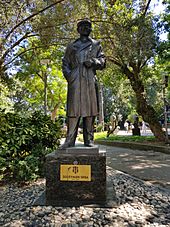
Two players served Beşiktaş as both a player and a president: Hakkı Yeten and Süleyman Seba. The club gave them the title "Honorary President." Hakkı Yeten also managed the first team from 1949 to 1951. In 2008, Beşiktaş put up a statue of Süleyman Seba near their office in Akaretler.
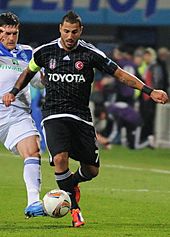
Besides Yeten and Seba, 11 players spent their entire careers at Beşiktaş. Nine of them played for over 10 years and had more than 100 appearances. These include Hakkı Yeten, Rıza Çalımbay, Samet Aybaba, Rasim Kara, and Sergen Yalçın. These five also served the club as both a player and a manager. Yalçın is the only one who won Süper Lig titles as both a player and a manager.
Six players from Beşiktaş have played for their country more than 30 times. These are Rıza Çalımbay, Recep Çetin, Mehmet Özdilek, Tayfur Havutçu, İbrahim Üzülmez, and Oğuzhan Özyakup. Five of these six players were also team captains for at least two seasons.
In 2003, for its 100th anniversary, the club asked fans to vote for the "squads of the century." They chose three teams: "golden," "silver," and "bronze." The results were announced at a special event on June 21, 2003.
Some Beşiktaş players have also played for their countries in big international tournaments. Tayfur Havutçu and İlhan Mansız were part of Turkey's team in the 2002 FIFA World Cup. Turkey reached the semi-finals that year. Mansız scored a "golden goal" in the quarter-final against Senegal. This sent Turkey to the semi-finals. He also scored twice in the game for 3rd place against South Korea.
Ricardo Quaresma was part of the Portugal team that won Euro 2016. This was Portugal's first international title. Quaresma scored a goal in the Round of 16 against Croatia. Domagoj Vida played for Croatia in the final of the 2018 FIFA World Cup against France. Croatia lost 4–2, but Vida helped set up a goal for his teammate Ivan Perišić.
Squads of the Century
| Beşiktaş J.K. Squads of Century | ||||
|---|---|---|---|---|
| Team | # | Golden Team | Silver Team | Bronze Team |
| Goalkeeper | 1 | |||
| Right back | 2 | |||
| Centre back | 4 | |||
| Centre back | 5 | |||
| Left back | 3 | |||
| Right Midfielder | 7 | |||
| Midfielder | 8 | |||
| Midfielder | 10 | |||
| Left Midfielder | 6 | |||
| Forward | 9 | |||
| Forward | 11 | |||
Players Who Played Only for Beşiktaş
These players spent their entire senior football careers playing for Beşiktaş:
| Years | Nat | Name | Apps | Goals | Ref |
|---|---|---|---|---|---|
| 1927–1944 | Hüsnü Savman | 294 | 42 | ||
| 1930–1950 | Şeref Görkey | N/A | 320 | ||
| 1931–1948 | Hakkı Yeten | 439 | 382 | ||
| 1932–1947 | Mehmet Ali Tanman | 354 | 0 | ||
| 1938-1948 | Sabri Gençsoy | 137 | 61 | ||
| 1943–1955 | Faruk Sağnak | 273 | 25 | ||
| 1946–1954 | Süleyman Seba | N/A | 44 | ||
| 1955–1971 | Ahmet Özacar | 313 | 100 | ||
| 1962–1975 | Sanlı Sarıalioğlu | 314 | 65 | ||
| 1977–1984 | Süleyman Oktay | 117 | 5 | ||
| 1980–1996 | Rıza Çalımbay | 401 | 37 | ||
| 2009– | Necip Uysal | 463 | 6 | ||
| 2017– | Ersin Destanoğlu | 119 | 0 | ||
| 2022– | Semih Kılıçsoy | 85 | 16 |
Coaching History
The Beşiktaş football team has had many coaches from Turkey and other European countries. The first known coach was Şeref Bey. He coached the team for 14 years, from 1911 to 1925. This makes him the longest-serving coach. The most successful coach is Gordon Milne. He won the league three times in a row, along with other trophies.
|
|
Club Presidents
Here is a list of the presidents who have led Beşiktaş J.K. over the years:
|
|
Sponsorships
Beşiktaş has worked with many different companies over the years for their team kits and sponsorships. Here's a look at some of them:
| List of kit suppliers and sponsorships of Beşiktaş J.K. men's football department | ||||||
|---|---|---|---|---|---|---|
| Season | Kit Supplier | Shirt | Sleeve | Backside | Shorts | |
| 1977–78 | — | — | Pereja | — | — | |
| 1980–81 | KİP | — | ||||
| 1981–82 | Shirt: Umbro, Shorts: Adidas | Bako | ||||
| 1982–83 | Umbro | Anka | ||||
| 1983–84 | Doysan, Bağbank | |||||
| 1984–85 | Sony | |||||
| 1985–86 | Sport | |||||
| 1986–87 | Adidas | Beslen Makarna | ||||
| 1987–88 | Toshiba, Titibank | |||||
| 1988–89 | Titibank, Bozkurt Mensucat | |||||
| 1989–90 | Demirdöküm, Aygaz Fırın | |||||
| 1990–91 | Beko | |||||
| 1991–92 | ||||||
| 1992–93 | ||||||
| 1993–94 | ||||||
| 1994–95 | ||||||
| 1995–96 | ||||||
| 1996–97 | ||||||
| 1997–98 | ||||||
| 1998–99 | Reebok | |||||
| 1999–00 | ||||||
| 2000–01 | ||||||
| 2001–02 | Puma | Avea | ||||
| 2002–03 | ||||||
| 2003–04 | Turkcell | |||||
| 2004–05 | Turkcell | |||||
| 2005–06 | Umbro | Cola Turka | Avea | |||
| 2006–07 | ||||||
| 2007–08 | ||||||
| 2008–09 | ||||||
| 2009–10 | Adidas | |||||
| 2010–11 | ||||||
| 2011–12 | Toyota | Ülker | ||||
| 2012–13 | ||||||
| 2013–14 | — | Kalde | Bahçeşehir Koleji | |||
| 2014–15 | Vodafone | Kalde | Beko | — | ||
| 2015–16 | Coca-Cola | |||||
| 2016–17 | ||||||
| 2017–18 | ||||||
| 2018–19 | Bahçeşehir Koleji | |||||
| 2019–20 | ||||||
| 2019–20 | Aksa | |||||
| 2020–21 | Beko | Güriş | Aksa | |||
| 2021–22 | Sompo Japan | |||||
| 2022–23 | Rain | Aksa | Beko | Nesine.com | ||
| 2023–24 | Nesine.com, Papara | Pasha Group | ||||
| 2024–25 | Beko | Nesine, Papara | Safi Çimento | Bahçeşehir University, Pasha Group | ||
Affiliated Clubs
Beşiktaş J.K. works with these clubs:
See also
 In Spanish: Beşiktaş Jimnastik Kulübü para niños
In Spanish: Beşiktaş Jimnastik Kulübü para niños


